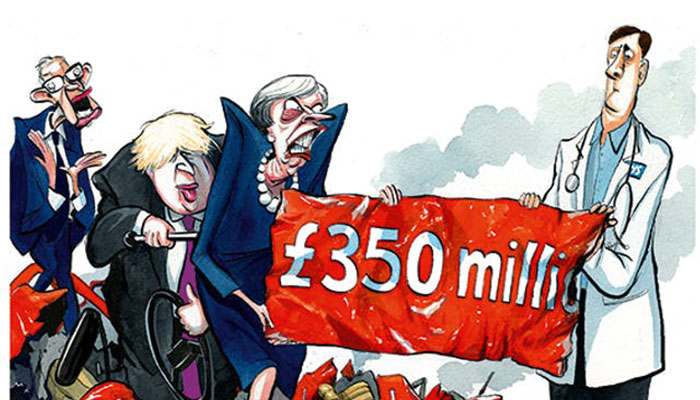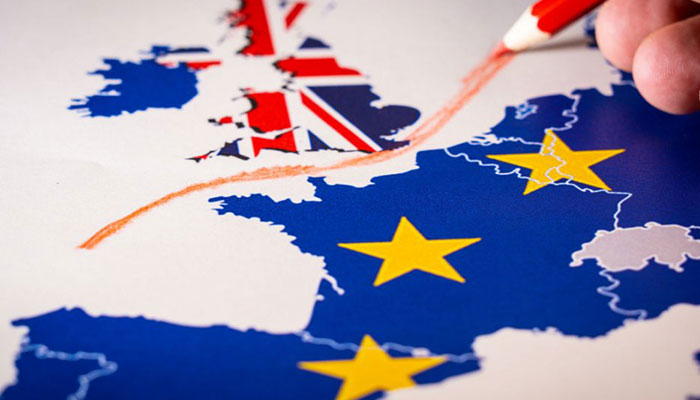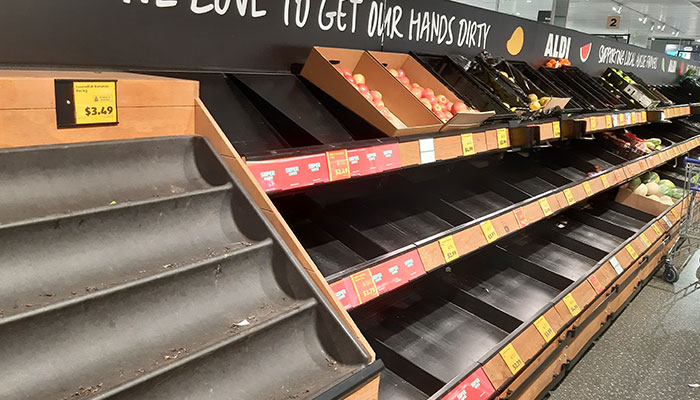The number of new investments in the UK from the EU27 has declined by 11% (Breinlich et al, 2019) and the output loss due to Brexit is estimated at around £350 million a week (Born et al, 2018).

Hip pocket pain: life will cost more in a divorce for people living in the UK, says economist Natalia Ponomareva. Image credit: The Spectator, UK.
Concerns about Brexit is an increasing source of uncertainty for businesses. Due to this uncertainty, growth in investment and employment in the UK has reduced by 6% and 1.5%, respectively, and UK future productivity is likely to fall by half of a percentage point (Bloom et al, 2018).
If the split goes ahead without any arrangements (now scheduled on April 12), it will be painful.
With more than half of all UK trade being with the EU, increasing tariffs and non-tariff barriers as well as disruptions to supply chains will lead to a decrease in the UK exports and sales.
Cost of living to rise
Restricted labour movement will result in rising labour costs in the UK which, coupled with import tariffs, will lead to an increase in cost of living. These are just some negative consequences of disorderly divorce on the UK.
The no-deal Brexit will be the worst-case scenario with possibly disastrous consequences for both economies.
Over the past few weeks British Parliament has had several important Brexit-related votes: one about accepting the recent deal with the EU, one about exiting with no-deal and one about delaying the exit. Both of the first proposals were voted down while the third vote saw MPs support a delay to the EU departure.
Prime Minister Theresa May has requested and received a short extension from the EU. So the three possible scenarios are on the table again: (i) Brexit with some deal, (ii) Brexit without a deal, (iii) no Brexit at all.
What are the possible economic costs of different scenarios for the UK and EU27?
Using some plausible assumptions about tariffs and non-trade barriers under different scenarios, Vandenbussche et al (2017) make the following estimates.
Hard Brexit could cost half a million UK jobs
A hard Brexit would cost half a million jobs in the UK and more than a million jobs in the EU27, in both cases four times as many as a soft Brexit. The hard Brexit would also lead to a loss of 4.5% of GDP in the UK and 1.5% of GDP in the EU27 compared to a loss of 1.2% of GDP in the UK and 0.4% of GDP in the EU27 with a soft Brexit.
This implies that the best economic outcome for both the UK and EU would be a reversal of Brexit, which is still possible.

The no-deal Brexit will be the worst-case scenario with possibly disastrous consequences for both economies. Given that the EU has agreed to delay Brexit, uncertainty about the final choice is back. However, while living with uncertainty is also costly, it is better than facing the consequences of non-reversible decisions without exploring all possible alternative options.
Natalie Ponomovera is a Senior Lecturer in the Macquarie Business School Department of Economics.
References:
Bloom, N., Chen, S. and P. Mizen (2018) “Rising Brexit uncertainty has reduced investment and employment” , VOX CEPR Policy Portal, November 2018 https://voxeu.org/article/rising-brexit-uncertainty-has-reduced-investment-and-employment
Born, B., Müller,G., Schularick,M. and P. Sedláček (2018)” £350 million a week: The output cost of the Brexit vote”, VOX CEPR Policy Portal, October 2018, https://voxeu.org/article/300-million-week-output-cost-brexit-vote
Breinlich, H, E Leromain, D Novy and T Sampson (2019a), “Voting with their Money: Brexit and Outward Investment by UK Firms”, CEP Brexit Analysis No. 13, Centre for Economic Performance, London School of Economics.
Vandenbussche, H, W Connell and W Simons (2017), "Global Value Chains, Trade Shocks and Jobs: An Application to Brexit", CEPR Discussion paper 12303.



